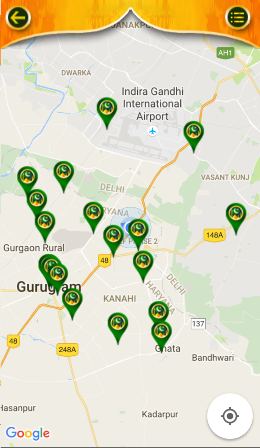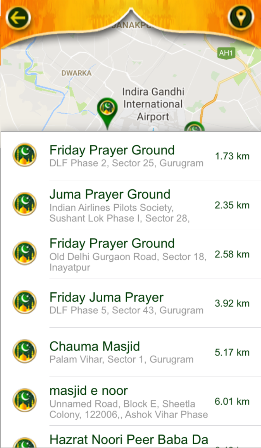


Mosque finder helps the users locate a mosque near them to offer Namaz and feel connected with Allah. In situations where you are travelling to an unknown destination this feature helps you in locating the mosques in your vicinity and also get a prayer time alert along with an azan. You can select a mosque from the map and get directions to the mosque using Google maps. Never miss a prayer of Maghreb in mosque when you finish with your daily tasks.
Nearest mosques are shown up in the list. This is the most precise masjid locator, and most accurate mosque locator. When someone asks you how to find Allah? Let them know this feature and they can feel Allah’s blessings upon them by visiting the most mesmerizing mosques in the vicinity.

Once you selects to use mosque finder, the details of mosques can be seen in the form of a list. The maps can be used to get directions and mode of transport details as well. The distance to mosque is also given to make the users aware of the estimated time taken to reach there.
Upcoming features would include the best mosques, most visited mosques, history of mosques etc. The only place to find Allah on Earth is to visit a mosque/masjid. Daily life of a Muslim should be such that he should be able to at least have a Mosque near him (that is why we have this amazing feature of mosques near me!).
A mosque (also called, Al-masjid) is a place of worship for followers of Islam. There are strict and detailed requirements in Sunni jurisprudence (fiqh) for a place of worship to be considered a masjid, with places that do not meet these requirements regarded as musallas. There are stringent restrictions on the uses of the area formally demarcated as the mosque (which is often a small portion of the larger complex), and, in the Islamic Sharia law, after an area is formally designated as a mosque, it remains so until the Last Day.[1]
Many mosques have elaborate domes, minarets, and prayer halls, in varying styles of architecture. Mosques originated on the Arabian Peninsula, but are now found in all inhabited continents. The mosque serves as a place where Muslims can come together for salat (صلاة ṣalāt, meaning "prayer") as well as a center for information, education, social welfare, and dispute settlement.[2] The imam leads the congregation in prayer.
The first mosque in the world is often considered to be the area around the Kaaba in Mecca now known as the Masjid al-Haram. Since as early as 638 AD, the Masjid al-Haram has been expanded on several occasions to accommodate the increasing number of Muslims who either live in the area or make the annual pilgrimage known as hajj to the city. Others regard the first mosque in history to be the Quba Mosque in present-day Medina since it was the first structure built by Muhammad upon his emigration from Mecca in 622.
The Islamic Prophet Muhammad went on to establish another mosque in Medina, which is now known as the Masjid an-Nabawi, or the Prophet's Mosque. Built on the site of his home, Muhammad participated in the construction of the mosque himself and helped pioneer the concept of the mosque as the focal point of the Islamic city. The Masjid al-Nabawi introduced some of the features still common in today's mosques, including the niche at the front of the prayer space known as the mihrab and the tiered pulpit called the minbar.f The Masjid al-Nabawi was also constructed with a large courtyard, a motif common among mosques built since then.
Islam's holiest month, Ramadan, is observed through many events. As Muslims must fast during the day during Ramadan, mosques will host iftar dinners after sunset and the fourth required prayer of the day, maghrib. Food is provided, at least in part, by members of the community, thereby creating daily potluck dinners. Because of the community contribution necessary to serve iftar dinners, mosques with smaller congregations may not be able to host the iftar dinners daily. Some mosques will also holdsuhoor meals before dawn to congregants attending the first required prayer of the day, fajr. As with iftar dinners, congregants usually provide the food for suhoor, although able mosques may provide food instead. Mosques will often invite poorer members of the Muslim community to share in beginning and breaking the fasts, as providing charity during Ramadan is regarded in Islam as especially honorable.
Following the last obligatory daily prayer (Isha') special, optional tarawih prayers are offered in larger mosques. During each night of prayers, which can last for up to two hours each night, usually one member of the community who has memorized the entire Quran (a Hafiz) will recite a segment of the book. Sometimes, several such people (not necessarily of the local community) take turns to do this. During the last ten days of Ramadan, larger mosques will host all-night programs to observe Laylat al-Qadr, the night Muslims believe that Muhammad first received Quranic revelations. On that night, between sunset and sunrise, mosques employ speakers to educate congregants in attendance about Islam. Mosques or the community usually provide meals periodically throughout the night.
During the last ten days of Ramadan, larger mosques within the Muslim community will host Iʿtikāf, a practice in which at least one Muslim man from the community must participate. Muslims performing itikaf are required to stay within the mosque for ten consecutive days, often in worship or learning about Islam. As a result, the rest of the Muslim community is responsible for providing the participants with food, drinks, and whatever else they need during their stay.
A temporary place set aside for Islamic worship is called a musalla (Jama'at Khana in South Asia). A musallah is often not part of a permanent endowment (waqf), or it is otherwise not intended to become a permanent legal masjid (as defined in the Sharia). Often musallas are used while a community looks for a piece of land for a permanent masjid, or the establishment of a masjid is not practical at the time. They could be located in rented apartments, industrial units or store fronts.
Appointment of a prayer leader is considered desirable, but not always obligatory. The permanent prayer leader (imam) must be a free honest individual and is authoritative in religious matters. In mosques constructed and maintained by the government, the prayer leader is appointed by the ruler; in private mosques, however, appointment is made by members of the congregation through majority voting. According to the Hanafi school of Islamic jurisprudence, the individual who built the mosque has a stronger claim to the title of imam, but this view is not shared by the other schools.
Leadership at prayer falls into three categories, depending on the type of prayer: five daily prayers, Friday prayer, or optional prayers. According to the Hanafi and Maliki school of Islamic jurisprudence, appointment of a prayer leader for Friday service is mandatory because otherwise the prayer is invalid. The Shafi'i and Hanbali schools, however, argue that the appointment is not necessary and the prayer is valid as long as it is performed in a congregation. A slave may lead a Friday prayer, but Muslim authorities disagree over whether the job can be done by a minor. An imam appointed to lead Friday prayers may also lead at the five daily prayers; Muslim scholars agree to the leader appointed for five daily services may lead the Friday service as well.
All Muslim authorities hold the consensus opinion that only men may lead prayer for men. Nevertheless, women prayer leaders are allowed to lead prayer in front of all-female congregations.
All mosques have rules regarding cleanliness, as it is an essential part of the worshippers' experience. Muslims before prayer are required to cleanse themselves in an ablution process known as wudu. However, even to those who enter the prayer hall of a mosque without the intention of praying, there are still rules that apply. Shoes must not be worn inside the carpeted prayer hall. Some mosques will also extend that rule to include other parts of the facility even if those other locations are not devoted to prayer. Congregants and visitors to mosques are supposed to be clean themselves. It is also undesirable to come to the mosque after eating something that smells, such as garlic.
Islam requires that its adherents wear clothes that portray modesty. Men are supposed to come to the mosque wearing loose and clean clothes that do not reveal the shape of the body. Likewise, it is recommended that women at a mosque wear loose clothing that covers to the wrists and ankles, and cover their heads with a hijab or other covering. Many Muslims, regardless of their ethnic background, wear Middle Eastern clothing associated with Arabic Islam to special occasions and prayers at mosques. Islam requires that its adherents wear clothes that portray modesty. Men are supposed to come to the mosque wearing loose and clean clothes that do not reveal the shape of the body. Likewise, it is recommended that women at a mosque wear loose clothing that covers to the wrists and ankles, and cover their heads with a hijab or other covering. Many Muslims, regardless of their ethnic background, wear Middle Eastern clothing associated with Arabic Islam to special occasions and prayers at mosques.